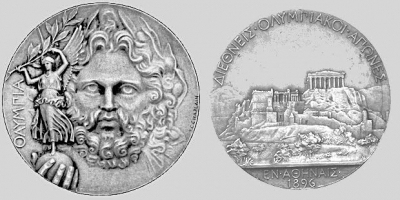
The first modern Games were held in 1896 in Athens, Greece, with 13 countries and 311 athletes taking part in the competition. During the first modern Olympics, medals were awarded to only the top two finishers: a silver medal to the winner and a bronze medal to the runner-up. The winner also received a crown of olive branches, and the runner-up a laurel crown.
Medal designs have varied considerably since the first Olympic Games in 1896, particularly in size and weight. A standard obverse (front) design of the medals for the Summer Olympic Games began in 1928 and remained for many years, until its replacement at the 2004 Games as the result of controversy surrounding the use of the Roman Colosseum rather than a building representing the Games’ Greek roots. The medals of the Winter Olympic Games never had a common design, but regularly feature snowflakes and the event where the medal has been won.
In addition to generally supporting their Olympic athletes, some countries provide sums of money and gifts to medal winners, depending on the classes and number of medals won.
Picture Credit : Google
